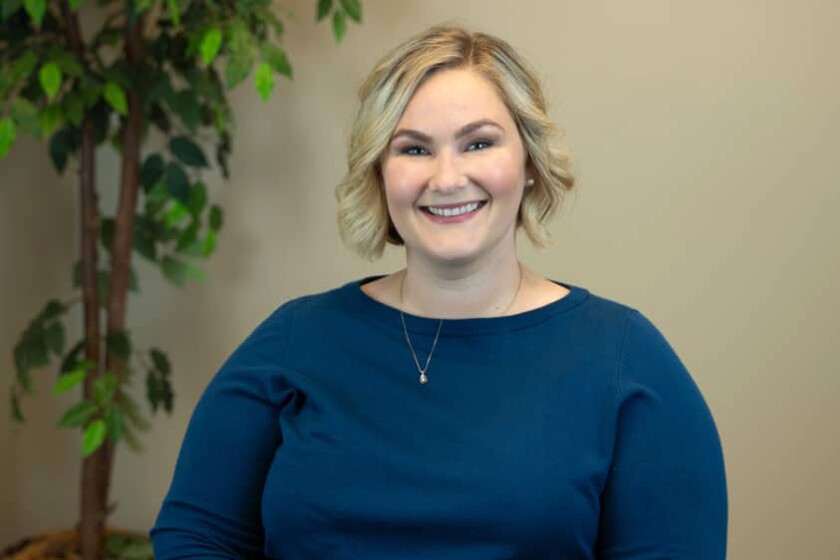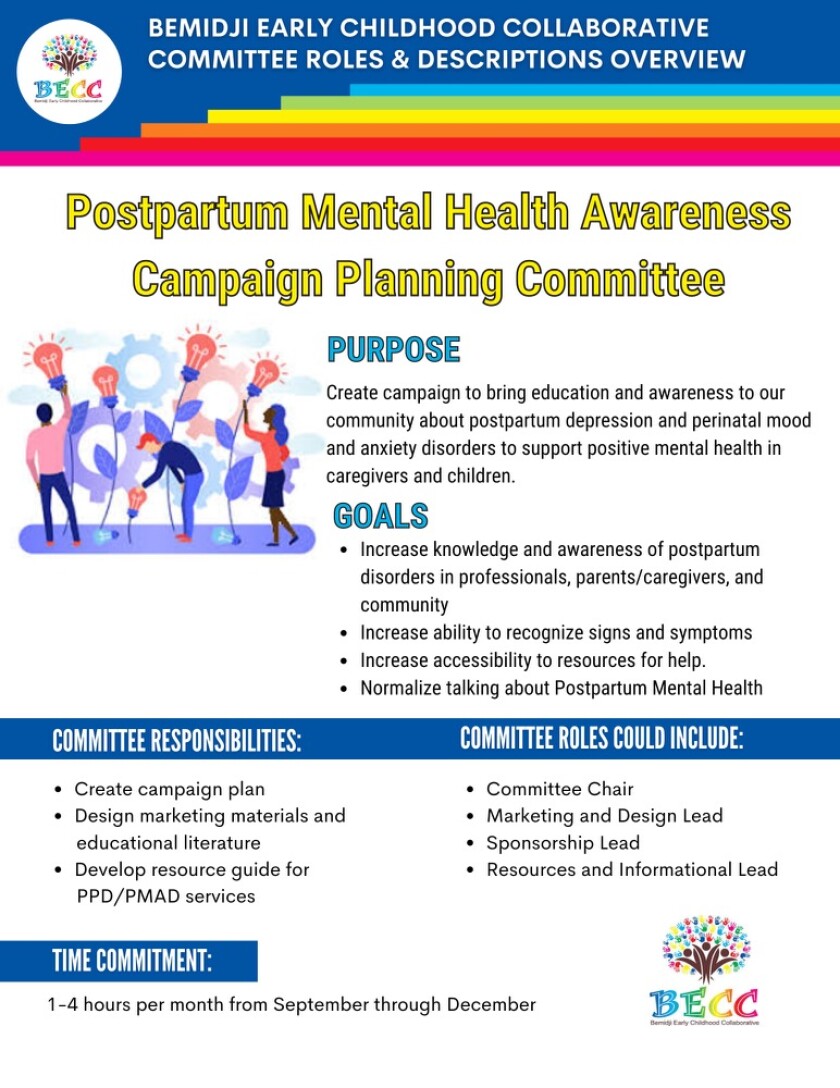BEMIDJI — Myths surrounding the new motherhood abound.
New parents are immediately filled with joy and love; bonding with baby is simple and easy; it’s just magical.
Of course, these things can happen to some degree, but they are certainly not the only things a new parent may experience.
Contrary to these happy expectations, mothers and fathers are often exhausted, stressed and overwhelmed.
“There are a lot of myths about motherhood that it’s supposed to be a happy experience, everything is supposed to be wonderful,” said Cailee Furer, director of the Bemidji Early Childhood Collaborative, “and the truth is that’s not always the case.”
About 80% of mothers experience “baby blues,” a period of time after birth characterized by low mood and energy. For some, this can lead to postpartum depression or anxiety, which can persist for months and may not appear until weeks later.
As common as these experiences are, new parents and expectant parents are often unprepared for these emotions and unsure where and how to seek help.
Even an OB/GYN specialist like Dr. Johnna Nynas of Sanford Health in Bemidji, who has worked with new and expecting mothers for years, found her personal experience with postpartum depression challenging.
“It was a really difficult thing to experience firsthand,” Nynas said, “and that really changed the way I practice medicine and how I approach these patients.”
contributed
All of this inspired BECC to put together an awareness campaign and begin providing different types of support for parents experiencing postpartum depression or anxiety.
Postpartum depression is incredibly common, with one in seven women experiencing it. About 25% of fathers also show symptoms of postpartum depression.
Feeling sad, irritable, fearful, or emotionally disconnected can be a sign of postpartum depression. Many report difficulty sleeping, an obsession with security, or a feeling of guilt or shame.
There may also be “red flag” symptoms, including thoughts of harming yourself or the baby, seeing or hearing things that aren’t there, or being unable to think or communicate properly. If someone is experiencing any of these, it is important to seek immediate medical attention.
“It’s the most common complication of pregnancy and postpartum,” said Malissa Kerr, a childbirth educator and doula who specializes in perinatal mental health. “And it’s not the mother’s fault.”
These feelings can last for months or even a year after delivery and can be overwhelming and isolating. In many cases, new mothers are hesitant to talk about it for fear of being judged.
“They’re afraid to tell people ‘this is how I feel,'” Kerr explained. “They are afraid of being seen as a bad mother who is not doing a good enough job.”
Another reason new parents might not seek help is that they may not recognize what they’re going through as postpartum depression or anxiety. This may be due to a lack of awareness and information about these conditions, or by carefully masking their stress as productivity and good parenting.
“They can look very close together and that’s how they look on the outside,” Nynas said. “But on the inside, that constant movement, that constant need to make sure everything is perfect, is actually a manifestation of uncontrolled anxiety.”
Like many other parts of mental health, postpartum depression and anxiety have had a great deal of stigma attached to them for decades. Talking about them was and still can be considered taboo, despite how common they are.
“I think mental health, in general, has historically had a lot of stigma,” Nynas said. “The stigma is getting better, but there is still a stigma.”
She explained that a primary way to combat this is to talk honestly about experiences with childbirth and with postpartum depression and anxiety. This can be both with other parents and with health professionals.
New parents already experience high expectations as to what they should be doing, and a considerable amount of judgment can follow if they don’t meet those expectations. This can further complicate discussions about postpartum mental health and make them more difficult.
“I think there’s a lot of genuine fear, particularly in women,” Nynas said, “that if we admit things aren’t right, or things aren’t what we expected, we’re somehow admitting failure, which is not entirely true. .”
Although there may be some hesitation around sharing mental health challenges, it is still a crucial part of seeking help and reducing stigma.
“Just having a safe space to talk about it and acknowledge it,” Furer added. “Knowing that you are not alone is really powerful.”
In an effort to raise more awareness, Kerr, Furer and Nynas and a handful of others in the community came together to form the Postpartum Mental Health Awareness Campaign Planning Committee. Currently, the committee is comprised of nearly a dozen members from various area organizations and businesses that support family wellness and perinatal emotional health.
Cailee Furer/BECC
The committee has gathered a variety of
local and virtual resources that can be found on the BECC website
.
These services, both local and online, offer new and expecting parents information and support, early childhood resources, and ways to connect with people going through similar experiences.
“We really want to make sure people know where to access help,” Furer said. “The more we talk about this, the more help we can get.”
Starting later this month, support groups will be available for parents struggling with infertility and miscarriage, and for those affected by stillbirth and infant loss, taking place at Sanford in Bemidji. They also hope to offer groups for those experiencing postpartum depression in the near future.
“It’s important that our communities, our families, be aware of what the signs and symptoms and risk factors are,” Kerr said.
These resources are particularly important for those parents who may have no or limited support system. Kerr connected this to how society often separates new parents from their extended families, a sentiment echoed by Furer.
“One of my favorite quotes is ‘It takes a town to raise a child,'” Furer said, “and we’ve lost our town.”
Without a support system, new parents often take on all the stress and responsibilities of raising a child, something that can overwhelm and isolate them. It can also compound the challenges of postpartum depression and anxiety.
All of this, the stigma, the isolation, the lack of awareness, highlights the importance of the support and information BECC provides.
“The three main things we talk about are understanding your triggers, knowing it’s treatable, and asking for help,” Kerr said.
Postpartum depression is not unusual, it can affect both mothers and fathers, it can be overwhelming and intimidating, but it can also be treated.
Parents who think they might be experiencing symptoms should know that they are not alone and can contact their health care providers and start seeking help.
“It’s a very brave thing to do to seek help,” Nynas said, “and sometimes that’s the hardest part of the whole process.”
window.fbAsyncInit = function() {
FB.init({
appId : ‘880572159243904’,
xfbml : true,
version : ‘v2.9’
});
};
(function(d, s, id){
var js, fjs = d.getElementsByTagName(s)[0];
if (d.getElementById(id)) {return;}
js = d.createElement(s); js.id = id;
js.src = “https://connect.facebook.net/en_US/sdk.js”;
fjs.parentNode.insertBefore(js, fjs);
}(document, ‘script’, ‘facebook-jssdk’));


